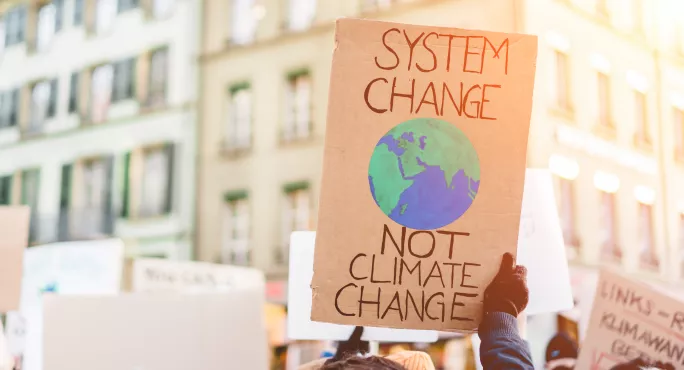- Home
- ‘Stop putting all society’s problems on to schools’
‘Stop putting all society’s problems on to schools’

Two weeks ago a petition was launched by four 15-year-old school pupils calling for climate change to be put on the national curriculum. The fact that these pupils are interested and engaged enough to start this petition and write a compelling case for it is, of course, to be applauded (and will come as little surprise to people who are lucky enough to work with young people day in day out). Unfortunately, this petition has now been jumped on and lauded by journalists and those working in university education departments. People who really should know better.
It is unfortunate for two reasons. Firstly, the adults supporting this petition should have been aware that climate change is already on the national curriculum. A cursory glance will show you that it already features in the geography curriculum and that it is taught at both GCSE and A level in both geography and the sciences. In my own subject, geography, it doesn’t only appear as a distinct topic within the GCSE specification but also links to all other topics as well.
On Monday I taught four lessons. We looked at the impact of deforestation on climate change, the impact of rising sea levels of coastal landforms and the implications of a changing climate on urban greening in London. This is not atypical. Theoretically, academy schools can ignore the national curriculum, but, in practice, they can’t ignore climate change if they want to prepare pupils for GCSEs.
Schools already cover climate change
These people could also have spent five minutes talking to actual teachers in a range of subjects to discover that climate change not only permeates those curricula where it is required, but is also being taught in subjects as diverse as English and design and technology. It is already on the curriculum in schools. In fact, I have yet to go in to, or hear about, a school where climate change doesn’t go beyond the curriculum and feature heavily in assemblies, whole-school activities based around Earth Day and Switch Off Fortnight and citizenship events. It appears in school papers and through the work of various environmental clubs. I would suggest that one reason why the response from some to this petition has been unfortunate is because it reveals how little they know about what actually happens in schools.
In fact, this really is just the latest case of the phenomenon of “Schools should teach….”. The campaign group Parents and Teachers for Excellence has been compiling lists of all those things that the media, pressure groups and others have suggested schools should add to their curriculum. In 2018 it identified 213 different things from knife crime to architecture and healthy parenting to revenge porn.
As its director, Mark Lehain, says: “It would help all concerned if they checked what is already taught before suggesting something, as often it's already covered in schools. And even where it isn’t, given how packed a curriculum is already, they should justify why their proposal takes priority and what should be removed to make way for it.”
This habit of laying the ills of society at the school gates is the second reason I find this petition dispiriting; it means that those actually responsible for climate change, and those with the power to make the immediate actions needed, can abdicate their responsibility. There is no need for them to act now; instead they can jump on a bandwagon and insist the problem will be solved by schools educating people about it in the hope, presumably, that in a couple of decades' time those people will then be in a position to do the things that should be done now.
Schools have been educating children about climate change, and environmental issues more generally, for decades. Clearly, this is not enough to make the difference we need to see. The fault for anthropogenic climate change is heavily tied to an economic system that relies on unsustainable exploitation of resources.
I understand that changing this is difficult and asking schools to teach climate change is easy, especially as it is already happening – but it is not a solution. Whether it is climate change, knife crime, online safety or radicalisation, we cannot keep avoiding making difficult decisions about wider societal problems by passing the buck to schools. Those in charge need to make some tough decisions and we, the people, will need to support them.
As adults, we can welcome the passion of young people who are demanding change without letting the actual culprits off the hook. Instead of wasting more time tinkering with a curriculum that already does a fine job in this area, let's direct their attention towards the true causes of climate change. Just like we have always done.
Mark Enser is head of geography and research lead at Heathfield Community College in East Sussex. His first book, Making Every Geography Lesson Count, is out now. He tweets @EnserMark
Keep reading for just £1 per month
You've reached your limit of free articles this month. Subscribe for £1 per month for three months and get:
- Unlimited access to all Tes magazine content
- Exclusive subscriber-only stories
- Award-winning email newsletters



